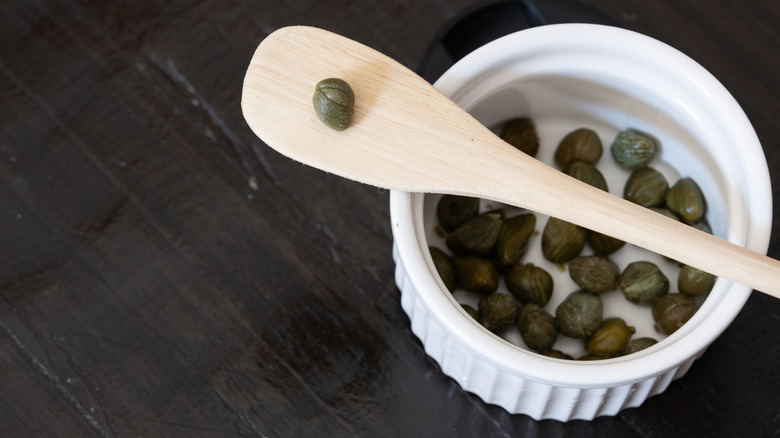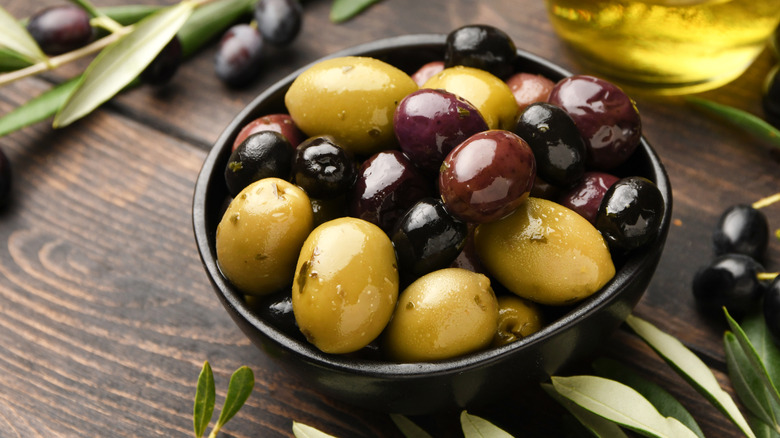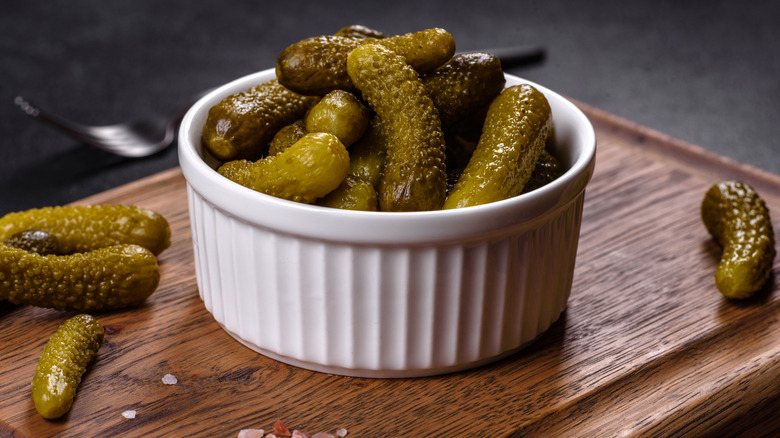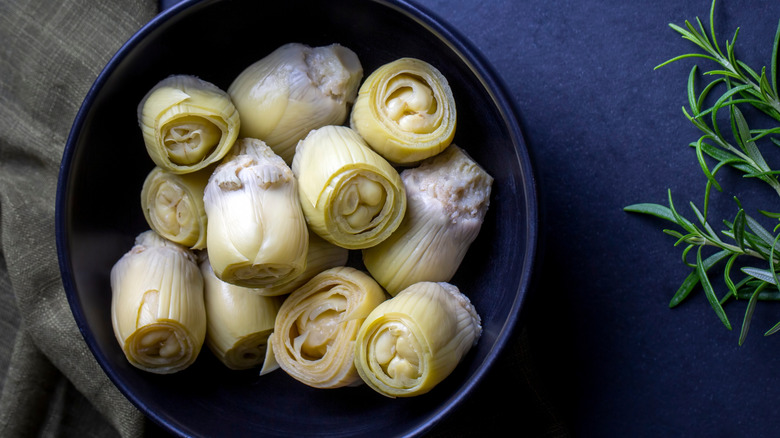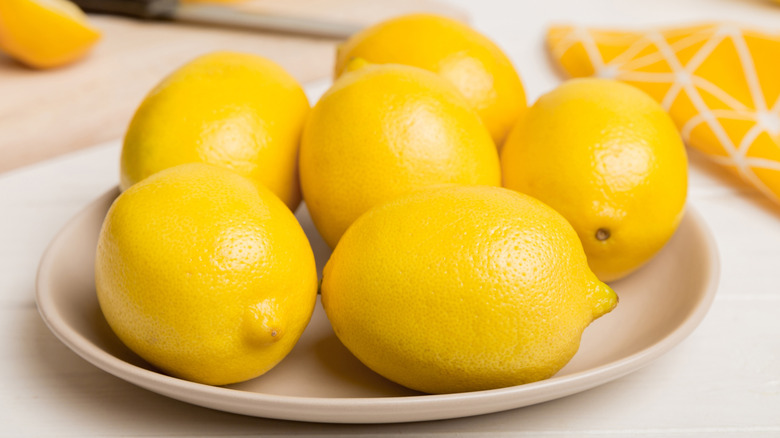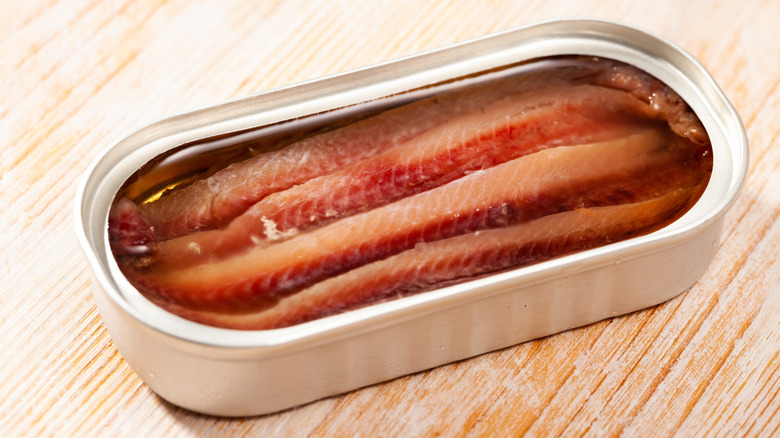5 Substitutes You Need If You Run Out Of Capers
If you're already rolling your eyeballs and thinking to yourself, "Run out of capers? As if I'd even have any in the first place," don't worry, we're not going to lecture you on how utterly indispensable they are. Whether you like them, loathe them, or aren't even sure what they are, we're not in the business of insisting you buy a product just because we say so. (Sure, we're foodies, but not the pushy kind.) Capers do add a certain something to recipes that call for them, though ... after all, they're there to supply more than just random green bumpy bits.
We'll admit there's no one-size-fits-all replacement for capers (which is true of most ingredients). Depending on what role they play in a recipe, though, whether it be adding brine, bitterness, tang, or a vegetal element, there are various different ingredients that can be used in their stead.
Perhaps the closest substitute would be pickled nasturtium buds, an item that once seemed to have been common (and cheap) enough to have earned the nickname "poor man's capers." Unless you're into both DIY and gardening and have time to make your own, though, they're probably a lot harder to get hold of than capers. (Not to mention, if the reason you don't have capers is because you don't like them, chances are you won't care for nasturtium buds, either.) We've therefore restricted this list of caper substitutes to items you're more likely to have in your fridge or pantry.
Olives
Olives make a fairly decent substitute for capers because they, too, have a briny flavor. The green ones would be the most similar visually since capers are also green. Kalamata olives will also work, although they tend to have more of a bitter flavor, while black olives make for a milder alternative. One great thing about olives is that if you bought them to experiment with making dirty martinis and haven't touched them since, they might still be okay because opened jar can stay good in the fridge for up to 18 months. To make the olives as texturally close to capers as possible, you'll need to chop them up. Once that's done, they can be substituted for capers on a one-to-one basis.
There is one instance when olives don't make a good substitute for capers — well, besides when you simply don't enjoy olives, that is. (Twitter finds them particularly polarizing.) If you're using a recipe like our Sicilian short ribs that calls for both olives and capers, it might be overkill to use a double portion of the ingredient. In such a case, you can either skip the olives altogether or opt for one of the other choices on this list.
Pickles
It's quite a pivot from capers to olives to pickles, but even though pickles are a far cry from either of these other ingredients, they, too, have a briny element, and they also have quite a bit of tang to them since they're brined in vinegar instead of salt water. Pickles, too, will need to be diced small, although if you're using cornichons, you won't need to do much chopping. Once chopped, though, they will provide a bumpy green garnish that's somewhat caper-like in appearance.
As the seasonings used to make pickles give them a very distinctive flavor that's really noticeable in a dish, and admittedly not too similar to that of capers, you'll need to pick and choose where you want to use them as a caper replacment. They wouldn't work well in pasta puttanesca, although if you're making a simple butter and lemon sauce for fish and you really like pickles, sure, they could be a caper stand-in here. (Especially if the fish in question is tuna — this fish seems to have quite the affinity for pickle relish judging by how many times the ingredient is used to punch up a tuna salad recipe.)
Marinated artichoke hearts
Marinated artichoke hearts are somewhat less likely to be something you”ll always have in the back of the fridge or pantry. Just in case you do have some left over, perhaps from making half a batch of our chicken sausage hodgepodge pasta dish (the recipe does make an awful lot), now you know what to do with them: Use them as caper stand-ins.
Visually, artichokes don't bear much resemblance to capers, even when you dice them small (and you should cut them in quarters, at the very least). While they are greenish, it's a much lighter shade than that of capers, olives, or pickles. In some dishes, the paler artichokes may even fade into the background. That's okay since they'll be working away stealthily in the background to provide a similar briny tang and earthy, vegetal funk. Unlike pickles, artichokes will also work well in just about any caper recipe since their flavor is subtle enough that it's unlikely to clash with most other caper-friendly ingredients.
Lemon
There are several different ways you can use lemon to stand in for capers in a recipe. If the capers are meant primarily as a garnish, you'll want to use lemon zest. While bright yellow lemon zest looks nothing like capers, it will add a similar level of visual appeal as well as providing a slight hint of bitterness also found in capers. If the capers are a more integral element of the dish, lemon juice can compensate for any missing tanginess and again, lemons are such a universal ingredient that you'd be hard put to find a recipe for capers that wouldn't also be enhanced by the addition of a little citrus. Many such recipes already contain lemon, though, so you'll need to make the call on a case-by-case basis as to whether more is really called for.
If you happen to have a jar of preserved lemons on hand, you can dice and substitute an equal amount of these for capers as they have brine and bitterness as well as tang. As they are solid, they also provide that visual element lacking in lemon juice. One issue with preserved lemons, however, is that they are quite salty, so you should plan on reducing any salt used in the recipe to compensate.
Anchovies
Anchovies, like capers and olives, can be a rather controversial food, and if you fall into the sizable camp of people who hate them, you probably won't even have them on hand, much less want to use them as caper replacers. If you do enjoy them, though, they are worth a try. They, too, have some brininess to them, although theirs comes straight from the ocean. Anchovies also add depth to the flavor, bringing a savoriness that surpasses those of capers themselves.
With anchovies, though, you'll want to use these in moderation and again watch the salt content of the dish. You can reduce the anchovies' saltiness to some extent by rinsing them in cold water before chopping and substituting them for capers in your recipe. It's also possible to cut down on the fishy flavor by sprinkling the anchovies either with olive oil or a mixture of water and vinegar and allowing them to sit for a few minutes (10 in the first place; five in the second).
